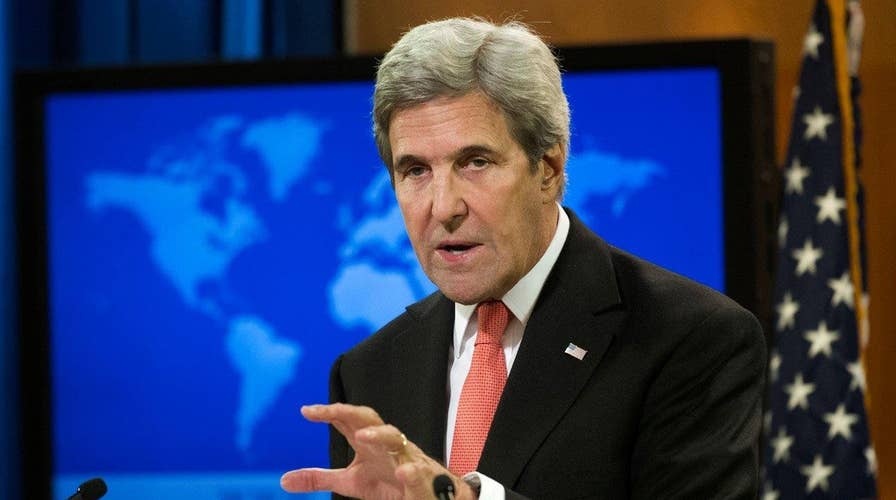Secretary of State Kerry offers parting thoughts
The top diplomat admitted Obama's failure to enforce his own 'red line' against Assad damaged America's standing with Mideast allies; James Rosen provides insight on 'Special Report'
Secretary of State John Kerry took a swipe at another U.S. ally this week, this time pointing the finger at the United Kingdom for the Obama administration’s struggle to enforce the “red line” in Syria – a week after he slammed Israel's government over settlements.
At a final press conference in Washington, D.C. Thursday, Kerry tackled the claim that President Obama did not properly enforce his 2012 vow that the use of chemical weapons by Syrian President Bashar al-Assad would cross a "red line." When Assad used sarin nerve gas in 2013, the administration didn't respond with military force.
Kerry disagreed with the narrative that Obama failed to enforce the red line, however, saying the president did intend to act -- but was steered off course after the British Parliament narrowly voted against bombing Syria in August 2013.
"The president of the United States of America, Barack Obama, did decide to use force. And he announced his decision publicly and said we’re going to act, we’re going to do what we need to do to respond to this blatant violation of international law and of warnings and of the red line he had chosen," he said.
"Now, we were marching towards that time when, lo and behold ... before the Friday decision, Prime Minister David Cameron went to Parliament ... and he sought a vote of approval for him to join in the action that we were going to engage in. And guess what? The Parliament voted no. They shot him down."
Kerry went on to say that Cameron’s decision to consult Parliament pushed Obama to consult Congress before engaging in airstrikes: "The president decided that he needed to go to Congress because of what had happened in Great Britain and because he needed the approval."
In the interim, Kerry said, Russian foreign minister Sergei Lavrov reached out to him, and they cooperated on a deal to get rid of Assad’s chemical weapons.
“The president never said, ‘I won’t drop a bomb.’ What happened was people interpreted it,” Kerry said, acknowledging that "perception" hurt.
Obama had previously called the U.K. vote “a major factor” in why there was no attack against Assad’s regime, but Kerry's remarks went into more detail.
When asked for comment on Kerry’s remarks, a spokesman for the U.K. Foreign Office did not address the remarks directly, but defended Britain’s record in Syria and said it will “continue to use all of the diplomatic levers at our command to reduce the suffering of the Syrian people by using our voice in the UN Security Council and support efforts to secure a political settlement based on transition away from the Assad regime.”
“Ministers have repeatedly expressed their disappointment that Parliament did not vote in [favor] of using force against Assad in 2013,” the spokesman added.
But critics said the remarks were an attempt by Kerry to gloss over one of the weakest points of Obama’s foreign policy record.
“Kerry is clearly trying to deflect away from the fact that the Obama administration’s Syria policy has been a complete and utter disaster, and this is a rather pathetic attempt to try to blame the British for President Obama’s own failure and lack of judgment,” Nile Gardiner, director of the Heritage Foundation's Margaret Thatcher Center for Freedom, told FoxNews.com.
British media including The Guardian also picked up on Kerry's comments.
Kerry’s remarks come less than a week after the secretary of state upset both the British and Israeli governments by lambasting what he called Israel’s “settler agenda.”
Defending the decision of the U.S. not to veto a U.N. resolution condemning Israeli settlements, Kerry called the current government the "most right-wing" in Israel's history and claimed its agenda is "driven by the most extreme elements."
The speech sparked fury from the Israeli government, with Prime Minister Benjamin Netanyahu calling the speech “skewed” and warning: “Israelis do not need to be lectured about the importance of peace by foreign leaders.”
A spokesman for U.K. Prime Minister Theresa May also said: “We do not believe that it is appropriate to attack the composition of the democratically elected government of an ally.”
Kerry’s claims about Syria aren’t the first time the administration has needled its British allies. In an interview with The Atlantic in April, Obama blamed Cameron for what he called “a sh-t show” in Libya, saying Cameron had become “distracted by a range of other things.”
Obama also ruffled feathers last year when he said if the U.K. voted to leave the European Union, it would be at the "back of the queue" for trade talks with America. Brits voted to leave anyway.
“[Kerry’s remarks are] a reflection of a broader disdain for Britain that runs through the Obama presidency,” Gardiner said. “Without a doubt the Obama administration has not treated Britain with the kind of respect America’s closest friend and ally deserves to be treated.”





